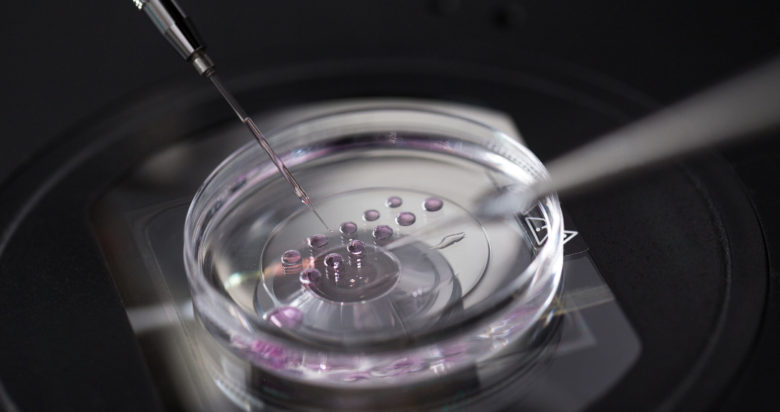In recent years, advancements in reproductive medicine have offered renewed hope to individuals and couples struggling with infertility. In vitro fertilization (IVF) has emerged as a highly effective assisted reproductive technology, helping countless individuals fulfill their dreams of parenthood. While IVF success rates have significantly improved as time goes on, optimizing the chances of a successful first IVF cycle remains a top priority for patients and healthcare professionals.
This article will cover a comprehensive guide on how to increase your IVF success rate, providing valuable insights and practical tips for maximizing your chances of a positive outcome.

Source: laurelfertility.com
Contents
Preparing for Success
Seek Expert Guidance:
Choosing a reputable fertility clinic and a skilled reproductive specialist is paramount. Research clinics, read patient reviews, and schedule consultations to find an expert who understands your unique needs and offers personalized care.
Evaluate Lifestyle Factors:
Make positive lifestyle changes to enhance your fertility potential. Reduce your alcohol intake, give up smoking, keep your weight under control, get regular exercise, and learn how to deal with stress. These modifications can improve the overall success of your IVF journey.
Understand Your Medical History:
Give your healthcare provider a thorough rundown of your medical history. Factors such as previous pregnancies, surgeries, and any underlying medical conditions may impact your IVF success. Providing accurate information enables your doctor to devise an individualized treatment plan.

Source: slma.cc
The Importance of Diagnostic Tests
Comprehensive Fertility Assessment:
Undergo a comprehensive fertility assessment to identify potential obstacles and optimize treatment outcomes. Diagnostic tests may include ovarian reserve testing, semen analysis, hormonal evaluations, anatomical assessments, etc.
Genetic Screening:
Consider genetic screening to identify potential hereditary disorders or chromosomal abnormalities. Preimplantation genetic testing (PGT) can improve embryo selection and increase the likelihood of a successful pregnancy.
Tailored Treatment Strategies
Personalized Treatment Plan:
Collaborate closely with your reproductive specialist to develop a tailored treatment plan based on your needs. Factors such as age, medical history, and diagnostic results will help determine the appropriate course of treatment.
Ovarian Stimulation:
The stimulation of multiple follicles is a crucial aspect of IVF. Follow your doctor’s instructions for administering fertility medications and attend regular monitoring appointments to ensure optimal follicular development.
Embryo Transfer Options:
Discuss with your doctor the number of embryos to transfer based on your circumstances and medical history. The decision regarding single or multiple embryo transfer is critical to avoid complications while maximizing the chances of success.

Source: ivfcanada.com
Coping with IVF Outcome Variability
IVF Success Rates:
IVF success rates can vary from person to person and cycle to cycle. While it is natural to hope for a positive outcome, be prepared for the possibility of multiple cycles or alternative reproductive options. Lean on your support system, maintain a positive mindset, and trust in the guidance of your healthcare team.
Self−Care and Resilience:
Practice self−care and resilience−building techniques during your IVF journey. Engage in activities that bring you joy and relaxation, nurture your emotional well−being, and cultivate resilience in the face of challenges. Remember that each step forward, regardless of the outcome, is a testament to your strength and determination.
Nutritional Support
A Balanced and Nutrient−Rich Diet:
Maintaining a healthy diet is crucial for optimizing your chances of IVF success. Focus on consuming nutrients−dense foods, including fruits, vegetables, whole grains, lean proteins, and healthy fats. Adequate intake of vitamins, minerals, and antioxidants can support reproductive health and embryo development.
Stay Hydrated:
Proper hydration is often overlooked but plays a vital role in optimizing fertility. Drink enough water throughout the day to support overall well−being and enhance blood circulation; it is also essential for reproductive functions.
Limit Caffeine and Alcohol Intake:
Excessive caffeine and alcohol consumption has been linked to decreased fertility and may negatively impact IVF success rates. Minimize your intake of these substances during your IVF journey to create a more favorable environment for conception.

Source: healthline.com
Mind−Body Techniques
Seek Emotional Support:
The IVF journey can be emotionally challenging. Surround yourself with a solid support system that includes loved ones, support groups, or counseling services. Sharing your experiences and concerns can alleviate stress and anxiety.
Mindfulness and Meditation:
Mindfulness and meditation techniques can help reduce stress and promote emotional well−being during IVF. Set aside dedicated time each day to engage in deep breathing exercises, guided meditation, or other relaxation techniques to alleviate anxiety and cultivate a positive mindset.
Stress−Reduction Activities:
Explore stress−reducing activities that resonate with you, such as gentle yoga, walking in nature, journaling, or engaging in hobbies that bring you joy. These activities can help you maintain balance and manage stress levels, ultimately contributing to a more successful IVF experience.

Source: asianinfertility.com
Understanding the Importance of Frozen Embryo Transfer (FET)
Frozen Embryo Transfer (FET) has gained significant importance in the field of in vitro fertilization (IVF) and has become a preferred method for many couples seeking fertility treatment. This technique involves freezing and storing embryos from a previous IVF cycle to be transferred at a later date. Here, we explore the reasons why FET has become an integral part of IVF and how it can improve the chances of a successful pregnancy.
Advantages of FET over fresh embryo transfer:
- Improved Endometrial Receptivity: With FET, the uterus can be carefully prepared for embryo transfer. The use of hormonal medications allows for optimal thickening of the endometrium, creating a favorable environment for implantation.
- Enhanced Timing: FET allows for greater flexibility in timing the transfer, ensuring that it aligns with the woman’s natural cycle or a more controlled cycle. This synchronization improves the chances of successful implantation.
- Increased Embryo Selection: By freezing multiple embryos from a fresh IVF cycle, the best-quality embryos can be selected for transfer during FET. This can lead to higher success rates and reduce the risk of multiple pregnancies.
Optimizing success rates with FET:
- Embryo Freezing Techniques: Utilizing advanced techniques such as vitrification for freezing embryos ensures higher survival rates and maintains the embryo’s viability during thawing.
- Genetic Screening: Preimplantation genetic testing (PGT) can be performed on frozen embryos, allowing for the selection of chromosomally normal embryos, which significantly improves implantation rates.
- Maternal Preparation: Prior to FET, the uterus is prepared with medications to synchronize the endometrium with the embryo’s developmental stage, increasing the chances of successful implantation.

Source: losangelesreproductivecenter.com
Conclusion
It is crucial to remember that the path to IVF success may involve multiple cycles and require patience and resilience. Therefore, embarking on an IVF journey can be both overwhelming and hopeful. By following these guidelines and working closely with a seasoned healthcare team, you can significantly increase the likelihood of achieving a successful first IVF cycle. Their specialists will provide ongoing support, counseling, and emotional care, ensuring you feel empowered and well−supported throughout your journey.
Remember, every individual’s journey is unique, and perseverance, combined with the right strategies, can bring you one step closer to the joy of parenthood!
